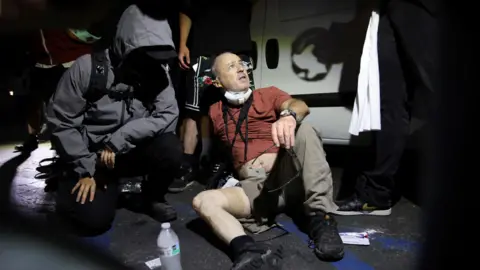In a troubling development amidst ongoing nationwide protests, a British news photographer, Nick Stern, has sustained serious injuries following an incident involving a non-lethal bullet during demonstrations in Los Angeles. These protests, sparked by growing frustrations over Immigration and Customs Enforcement (ICE) actions in the area, have evolved into a focal point for public outcry against perceived injustices. Stern, who relocated from Hertfordshire to the US in 2007, was capturing images of the protests when he was struck just before 9 p.m. local time, leading to an emergency medical situation.
While documenting the protests occurring outside a Home Depot store in Paramount, Stern reported immense pain after feeling a bullet penetrate his thigh. Describing the moment to the BBC, he stated, “There was something hard sticking out of the back of my leg, and my leg was getting wet from blood.” This alarming incident serves as a stark reminder of the dangers journalists face while covering volatile political situations. At the time, the protests against the ICE actions included demonstrators voicing their opposition to aggressive immigration raids that have significantly increased under President Donald Trump’s administration.
Stern’s injuries prompted immediate attention from fellow protesters and medics, who assisted in moving him from the scene. After the initial shock wore off, he vividly recounted, “From the moment I was hit, I felt incredibly faint.” His injury necessitated emergency surgery at Long Beach Memorial Medical Centre, where medical staff treated him for sustained damage and worked to remove the bullet.
Throughout his career, Stern has established himself as a prominent figure in the field of photojournalism, known for his proactive approach to documenting protests. Wearing visible press credentials and carrying a camera around his neck, he actively sought to remain safe while covering civil unrest. Despite this injury, Stern expressed determination to return to his work, emphasizing the critical importance of documenting the unfolding events. “This is too important and it needs documenting,” he stated, highlighting the commitment some journalists hold to their craft even in the face of personal risk.
Tragically, Stern is not alone in this experience. Lauren Tomasi, an Australian journalist working for 9 News, was also struck by a non-lethal round while she was filming her segment. Such incidents reflect the broader risks that journalists encounter in conflict zones, especially when covering charged political events.
The protests themselves have erupted in response to escalating tensions surrounding immigration policies, particularly emphasizing the impact that federal actions have on local communities. President Trump has defended the increase in ICE raids as necessary, promising to address the perceived crisis by deploying additional National Guard troops to California. His administration’s stance has created a rift, with California’s Democratic governor openly calling for the withdrawal of federal troops, arguing that their presence inflames tensions rather than alleviating them.
Stern’s commentary about the tight-knit nature of the communities affected further underscores the emotional weight that these immigration policies carry, stating that outside organizations like ICE are met with profound resistance due to their intrusive actions. Reflecting on similar past incidents, he mentioned that he had previously been injured while covering protests linked to police brutality following the death of George Floyd, underscoring the risks that journalists often face in pursuit of their work.
Overall, the combination of Stern’s harrowing experience and the ongoing unrest around issues of immigration highlights the complex and sometimes dangerous landscape in which journalists operate. Their role as witnesses to history remains vital, demonstrating both the importance of freedom of the press and the need for protections for journalists operating in conflict and protest zones. As Stern recovers, he remains steadfast in his commitment to continue covering these pivotal events, reminding us all of the critical nature of journalism in a democratic society.



